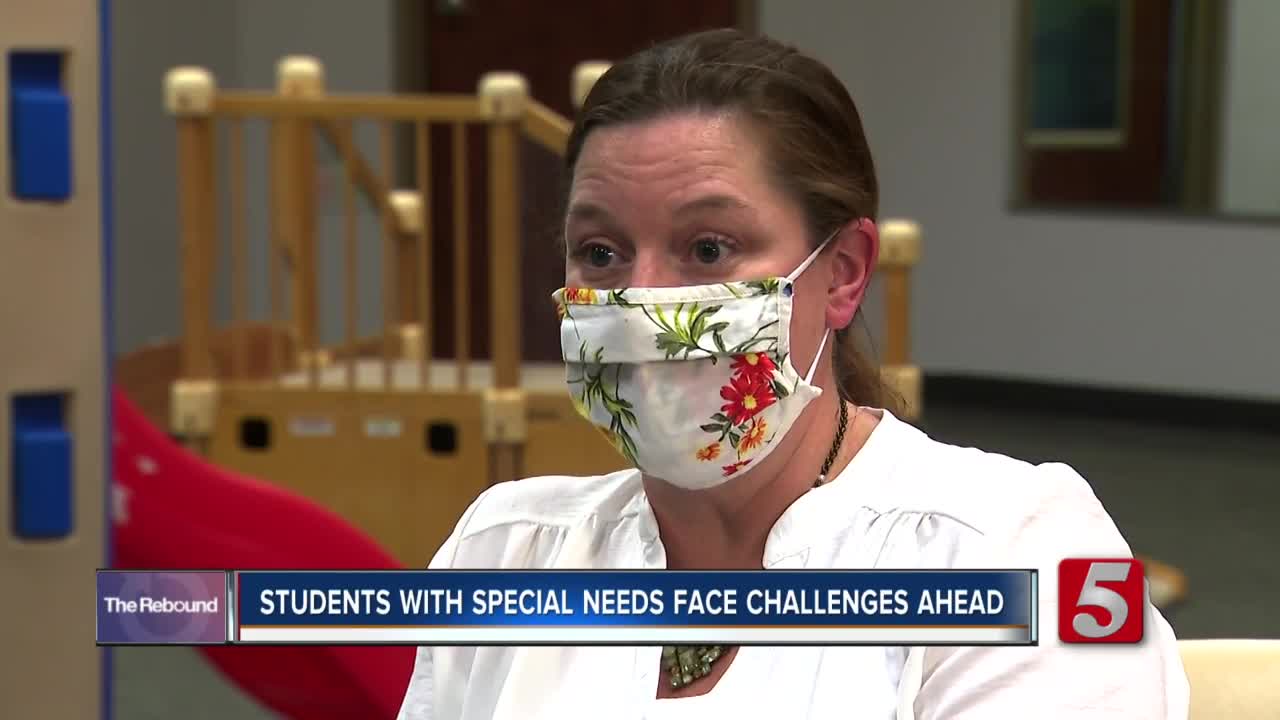BRENTWOOD, Tenn. (WTVF) — Emily Whitson knows the best way for her nine-year-old daughter with Down syndrome to learn is to go back to school, but the Williamson County mother is choosing to keep her home for the upcoming school year out of safety.
For many parents in a similar tricky position, concerns are mounting on what online learning could mean for the well-being of their child with special needs.
"You need the in-person services and in-person instruction often but because of the medical issue, you're kind of stuck in a position of having to choose between health and education," Whitson told NewsChannel 5. "I think it's an impossible situation for everyone and I think it's very hard to make these choices. Unfortunately, everyone is having to make sacrifices."
The Williamson County Schools Reopening Framework gives parents two options: send their children back to the classroom or devote a whole semester to the WCS Online Program. If for some reason all schools have to close based on the COVID-19 spread, a remote learning plan will be implemented for students not enrolled in the online program.
Each public school child who is qualified for special education must have an Individualized Education Program (IEP), a document designed collaboratively by teachers, parents, school administrators and other related services personnel to address specific needs and improve educational results.
WCS Spokesperson Carol Birdsong said IEP's will still be followed despite the changes this year, but Whitson is worried if her child can receive some type of service in person that would benefit her daughter. Parents will have to work with the school in greater detail to address implementing the IEP's if the child is staying home.
"I've talked to the principal and she's hoping she can set it up a safe or limited classroom with minimal exposure and cleaning in between. Or, do some in-person consultations where maybe I can go in and they teach me what I need to be doing at home," Whitson added.
Student Support Services Director Maria Griego said in a recent Facebook Q&A that masks are required even for students with sensory issues unless the child is unable to safely wear one. There can be exceptions if the parent discusses the issue with the child's principal.
If students need to be on-campus depending on their needs during a time of high-spread of COVID-19, Griego said logistics are still being worked out about bus transportation.
How is MNPS addressing students in special education?
The task could be more tricky for the roughly 10,000 special education students in Davidson County, where the new school year is going to start remotely for everyone through at least Labor Day.
The recent Metro Nashville Public Schools reopening plan says for each child with disabilities, the district is developing a COVID-19 Continuous Learning Individualized Plan (CLIP). The CLIP will identify how MNPS will implement the services and supports a child's lEP or Section 504 Plan when in a virtual setting. Staff is responsible for collaborating and coming up with the plan.
Teachers and related service providers will then be provided training this week and will be paid professional development stipends before school starts to develop the plan.
In a letter sent to parents earlier this month, parents should receive the plan when the school starts on August 4. MNPS employees will not be entering homes during virtual learning, nor is the district providing a hybrid schedule.
The letter said students are being assessed for any regression that has occurred during school closure. Teachers and related service providers will begin supporting access to core content and interventions as well as related services at the start of the school year. School staff will establish a schedule of ongoing check-ins and expectations for parent communication.
The Exceptional Education department will be hosting a town hall event for parents on July 30 to provide more information and answer questions about this process.
Organizations feel effects of COVID-19 on special needs community
Since it started in 2013, GiGi's Playhouse Nashville has been providing free educational and therapeutic services to children with Down syndrome.
Executive director Carter Abel said before the summer, programs were forced to convert to virtual which created new challenges. While it allowed people outside of the region to connect, it proved to be burdensome for many parents.
"It puts a lot of pressure on parents to be the ones who are supervising their kids and administering those therapies and supports," Abel said.
GiGi's Playhouse plans to offer a hybrid approach, similar to WCS, to help meet needs. For every age group, the organization will offer in-person services that are conducted safely and virtual options so families have a choice.


